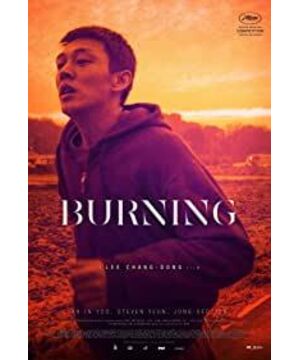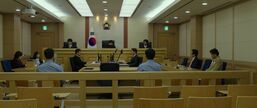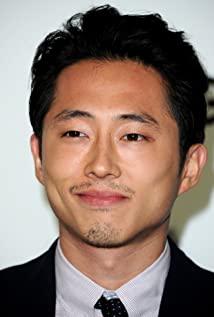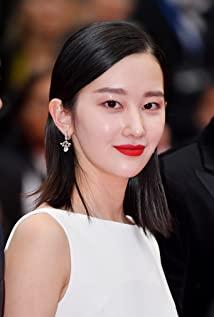Suspense and crime movies are almost the subjects that Korean directors are best at. I watched this film with the expectation of watching a brain-burning film. However, unlike what I expected, this film has no ups and downs, and the rhythm is relatively gentle. All the mysteries are slowly revealed from various metaphors. Imaginative. It's a far cry from the same genre. This is more of a literary movie than a suspenseful one.
Haimei: Unreal
Many film critics have mentioned the problem of director Li Changdong's "prop-based" female characters, but my opinion is somewhat different. Compared to Jong Soo and Ben, Hae Mi is actually a more transparent character.
In Haruki Murakami's original work, Haimei is a symbolic female figure who often relies on men to help her. Apart from peeling orange peels, there are no other flesh-and-blood plots, and the tendency to be instrumental is obvious.
But in the movie, Hae-mi's image is fuller, in line with my overall (possibly biased) impression of the female group - women are more sensitive to their own situation than men, and thus are more likely to fall into a kind of In a state of awake slump.
At the beginning of the film, Hae-mi and Jong-soo have dinner together. Hae Mi said that she was studying pantomime recently, so she performed orange peeling. She told Zhong Xiu that the secret to performing pantomime is not to imagine that there are oranges here, but to "forget that there are no oranges here". The novel describes Zhong Xiu's inner feelings at the time:
"I gradually felt that reality was being sucked out of my surroundings."
This is Zhong Xiu's feeling when watching Hai Mei performing the pantomime, and it is also the illusory color that runs through Hai Mei: "existence or nonexistence". From pantomime and non-existent oranges, to cats that don't exist or not, to non-existent wells, non-existent plastic sheds, girls in drawers, and finally Hae-mi who no longer exists.
Haimei's mysterious and suspenseful colors can be regarded as the hidden suspense main line of the movie .
Ben: emptiness
As a secular elite, Ben is elegant and rich, loves reading Faulkner's novels, loves smoking big ma, and has a hypocritical hobby that is very in line with literary and artistic tone - burning plastic sheds (original "burning warehouses"). Every two months, he would go to the fields to find an abandoned plastic greenhouse, set a fire, and enjoy the thrill of burning the greenhouse.
Ben is responsible for the dominant suspense thread in the film -killing the young women he associates with. Hae-mi is the final victim.
Impressively, after Hae-mi disappears, Ben takes out the makeup case from behind the bathroom mirror and applies make-up to his new girlfriend at home. The little girlfriend's expression had a shy smile, and she looked at Ben who was very close to her with some dodging eyes. On the other hand, Ben, who was in a completely different state from his girlfriend, looked empty and peaceful, and gently applied makeup to his girlfriend with an almost devout gesture. This is supposed to be an interesting interaction between lovers, but here in Ben, there is a kind of creepy coldness and weirdness, which makes people reminiscent of the scene of the undertaker putting makeup on the corpse.
Jong-soo goes to Ben to find clues about Hae-mi's disappearance. Ben said to him, "Hae Mi, she's lonelier than you think." "You're special to Hae Mi, she says you're the only person she trusts in the world, and you'll always be on her side. Listen to her. Saying this, I suddenly feel jealous. I have never been jealous of anyone in my life."
It would be far-fetched to say what kind of feelings Ben had for Hae-mi. But there is no doubt that Ben is someone who understands Hae-mi better than Jong-soo. He understood Hae-mi's loneliness, transparency, and the world-weariness that followed, and he knew that Hae-mi "is one that's easy to burn." And what is written in the novel is: "That barn is very good. I haven't encountered such a barn worth burning for a long time."
Zhong Xiu: Confused
Zhong Xiu, a down-and-out writer, reunites with Hai Mei, a childhood friend whom he has not seen for many years, and falls in love with her unconsciously. Haimei returned from her trip, but brought her boyfriend, Ben, whom she met during the trip. Jong-soo's role as a bystander has been watching Hae-mi's relationship with Ben, and Ben seems to be happy to be in touch with Hae-mi's good friend.
Once the two came to Zhongxiu's house, the three smoked mama together, and Haimei excitedly danced naked in nature... Ben told Zhongxiu that he had a hobby of burning plastic greenhouses. Burning down "the messy plastic greenhouses that are both useless and disturbing", the heart is filled with unparalleled pleasure. Ben told Zhong Xiu that this visit was actually a preliminary inspection, because he had already selected the greenhouse to be burned next time, which was very close to Zhong Xiu's house.
After that, Hae-mi disappeared.
Zhongxiu went to Ben, and Ben said that the plastic greenhouse mentioned earlier had been burned down. And Zhong Xiu checked all the greenhouses near his home every day, and none of the greenhouses disappeared.
Ben's new girlfriend shows up.
Previously, Zhongxiu was entrusted by Haimei to take care of a cat with "autism" called Boiler in her rented house during her travels. This cat is always hiding from people, and Zhong Xiu even suspected the existence of this cat at first. Until Hae-mi disappeared, Zhong-soo came to Ben's house and saw a newly adopted cat by Ben. He tried to call it Boiler, and the kitten responded instantly.
Zhongxiu remembered the first time she went to Ben's house with Hae Mi, and saw the vanity box in the bathroom and all kinds of women's accessories in the drawer. He opened the drawer again and saw the pink watch he gave Hae-mi inside.
There are various signs that Haimei is the shed that was burned down. And Ben never seemed to cover it up, and he always hinted at Zhong Xiu what he was doing with a condescending and condescending look, seemingly indifferent and fearless.
There are useless plastic greenhouses everywhere, disappearing and disappearing, no one cares.
class conflict
The film is based on the short story "Burning the Barn" by Haruki Murakami. The setting of the novel is relatively simple and the expression is more abstract. Zhongxiu and Haimei are not childhood acquaintances, and the characters do not have names. The movie has added many details, such as the "autistic" cat, the pink watch, the accessories in the drawer, the new girlfriend, the non-existent well... All kinds of details make all the characters concrete and three-dimensional. In the end, Zhong Xiu killed Ben and confirmed Ben's crime, which is also a plot only in the movie.
The color of class antagonism is intensified in the film: Jong-soo and Hae-mi representing the commoner class, and Ben representing the elite class.
This goes back to what I said earlier, the illusory color of Hai Mei. Hae-mi in the movie is more three-dimensional than in the novel, and a large part comes from the director's emphasis on class antagonism. As a civilian class, Haimei's sobriety and decadence, self-abandonment and powerlessness are not water without a source. While giving it a sense of mystery, it creates an illusory beauty of the overall image.
Ben describes the shed as "a mess of plastic sheds that are both useless and distracting" and that "the Korean police don't care about that", which is absent in the novel.
The film arranged for Hai Mei to dance twice . For the first time, Hae-mi performs the Bushman dance in front of Ben's rich friends. The clumsy and funny Hae-mi, the elites who hold back her laughter, the embarrassed and cramped Zhong Xiu... This is in stark contrast to Hai-mei's beautiful and ethereal nude dance after taking a big ma at Zhong Xiu's house.
This is the contrast between Hae-mi, who strives to play a worldly role, a humble person who entertains the elite, and the real Hae-mi who liberates her body and mind. It's the contrast between fantasy and reality.
The soft lines of Haimei's body blend with the evening twilight and the light and shadow of nature, and can't help but connect with what Ben calls "the morality of nature" .
Zhong Xiu asked Ben: "Whether (those plastic sheds) are useful, do you need to judge?"
Ben replied: "No, I'm not going to judge, just accept the reality, the reality that they're waiting for me to burn. It's the same as the rain. It rains, the river rises, and people get swept away—the rain does Judgment? There is no right or wrong in it, only the morality of nature.”
The class conflict that the director reinforces aggravates the sense of powerlessness in everyone, including Ben. Everyone is a plastic shed waiting to be burned, Hae-mi is Ben's plastic shed, and Ben is someone else's plastic shed. In the morality of nature, no one can truly stay away from the fate of being a plastic greenhouse.
Zhongxiu finally killed Ben, put the body in the car, and left the fire behind him like burning a plastic shed.
Ben became someone else's plastic greenhouse after all.
WeChat public account:
Sophora japonica
zhaodoudou232
View more about Burning reviews











